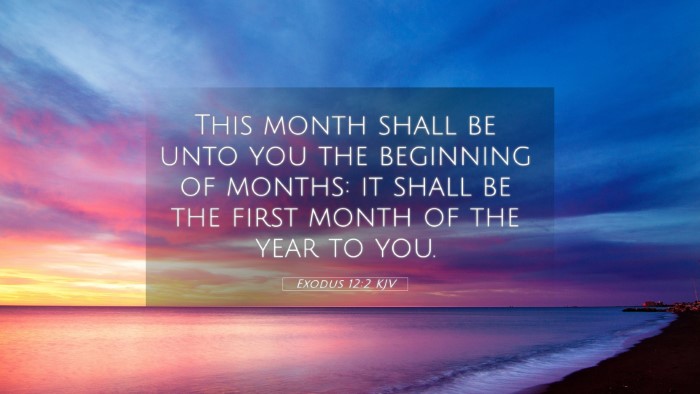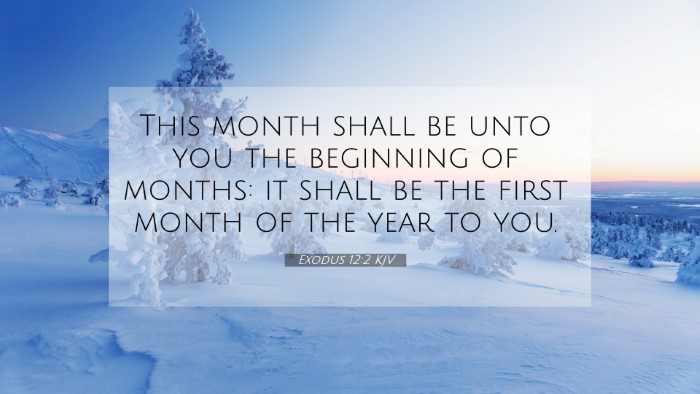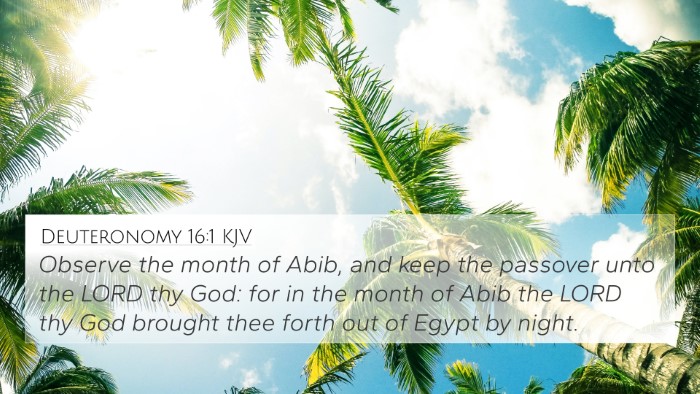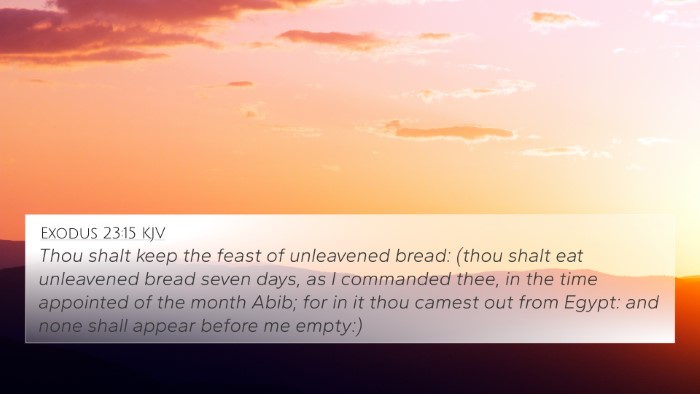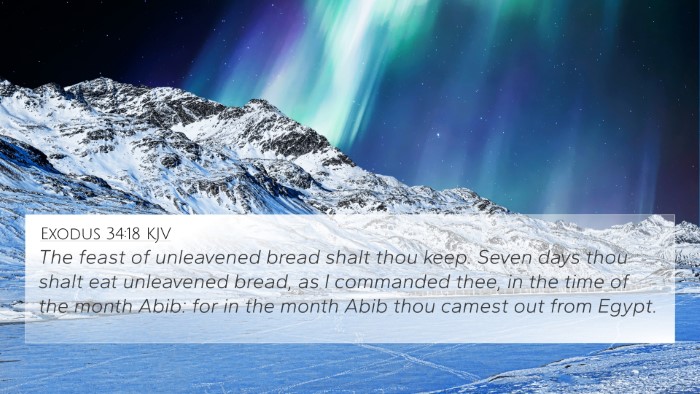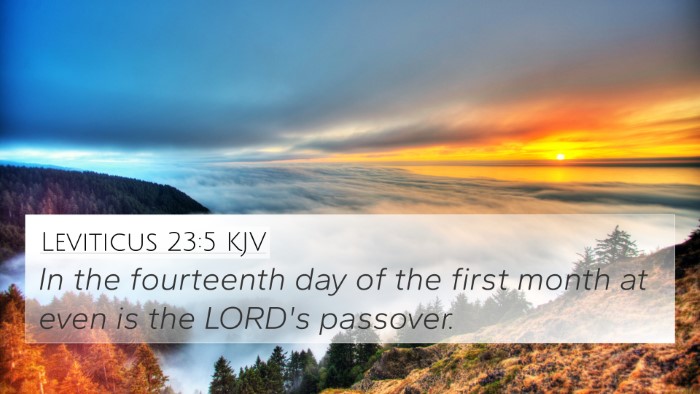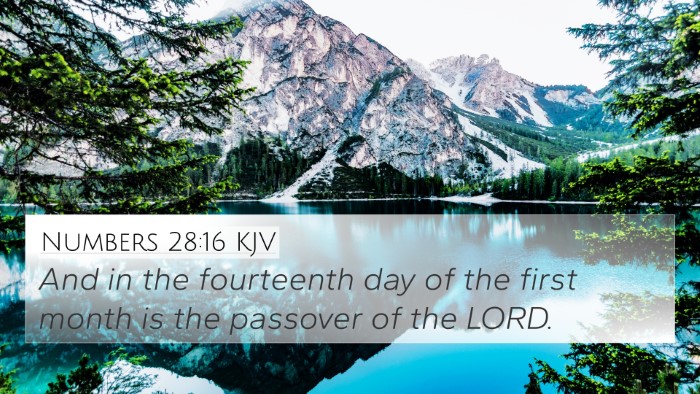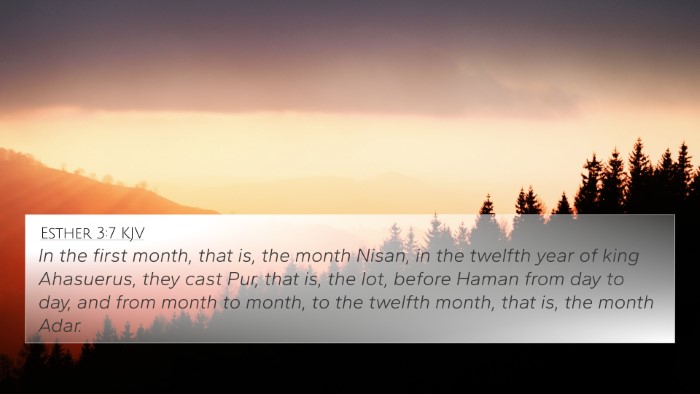Understanding Exodus 12:2
Exodus 12:2 states, "This month shall be to you the beginning of months: it shall be the first month of the year to you." This verse marks a significant change in the Israelite calendar, establishing the month of Abib (Nisan) as the start of their year. The implications of this directive are profound, providing a foundational moment in Jewish history and religious observance.
Interpretational Insights
Various commentators have provided insight into the meaning of this important verse:
- Matthew Henry: Notes that this command signifies not only a new beginning for the Israelites but also a divine appointment of their national identity and the remembrance of their deliverance from Egypt. Henry emphasizes how this points to God's orchestration of time and history.
- Albert Barnes: Highlights the theological significance of the month chosen, correlating it with God's intention to deliver His people. Barnes connects this moment to the broader theme of redemption and liberation central to the biblical narrative.
- Adam Clarke: Explains the cultural context of the calendar change, asserting that the new year symbolizes a fresh start and an era marked by God's intervention in Israel's history. Clarke stresses the importance of marking time in accordance with God's instructions.
Bible Cross-References
Exodus 12:2 can be linked to several other verses that share thematic and contextual parallels:
- Leviticus 23:5: "In the fourteenth day of the first month at even is the Lord's passover." - This verse connects to the institution of the Passover, which is pivotal in the Israelite's deliverance.
- Deuteronomy 16:1: "Observe the month of Abib, and keep the Passover unto the LORD thy God..." - Reinforces the significance of the month of Abib and the observance of Passover as a command from God.
- Matthew 26:17: "Now the first day of the feast of unleavened bread the disciples came to Jesus..." - Connects the Old Testament observance of Passover to the New Testament where Jesus establishes the Lord's Supper.
- 1 Corinthians 5:7: "For even Christ our passover is sacrificed for us." - This verse highlights the fulfillment of the Passover through Christ, making the connection between the Old and New Testament clear.
- Revelation 1:8: "I am Alpha and Omega, the beginning and the ending..." - A reflection on God's sovereignty over time that echoes the new beginnings initiated in Exodus 12:2.
- Hebrews 11:28: "Through faith he kept the Passover, and the sprinkling of blood..." - This verse emphasizes the faith-based aspect of the Passover observance, linking it back to God's instructions in Exodus.
- Romans 5:6: "For when we were yet without strength, in due time Christ died for the ungodly." - This illustrates God's timing in salvation history, paralleling the timing established in Exodus.
- Isaiah 43:18-19: "Remember ye not the former things, neither consider the things of old. Behold, I will do a new thing..." - The theme of new beginnings also resonates here, reminding the Israelites of God's faithfulness in creating new paths.
Thematic Connections
This verse is not merely historical; it serves as a pivotal moment that resonates throughout the biblical text, creating a rich inter-Biblical dialogue on themes of redemption, deliverance, and faith.
- New Beginnings: Exodus 12:2 signifies a fresh start for the Israelites, which can be seen in the redemptive arc throughout Scripture.
- Divine Sovereignty: The choice of month emphasizes God's control over the timeline of His people, a theme echoed in various passages.
- Celebration and Remembrance: The institution of Passover serves as a reminder of God's deliverance, a practice carried forward through both Jewish and Christian traditions.
Methods for Study
For those looking to delve deeper into the connections addressed in Exodus 12:2, utilizing tools for Bible cross-referencing can enhance your study:
- Bible Concordance: This resource helps locate key terms across scripture, making it easier to find related verses.
- Bible Cross-Reference Guide: Utilizing guides can provide themes and connections between various texts, aiding in comparative study.
- Cross-Referencing Bible Study: Engaging with this method allows for an analytical approach to understanding scriptural themes and messages.
Conclusion
In summary, Exodus 12:2 serves as a foundational verse that is rich in meaning and deeply interwoven with the narrative of Scripture. By exploring cross-references and utilizing various study tools, one can gain a fuller understanding of its implications both in the context of the Old Testament and in the light of New Testament revelations.

